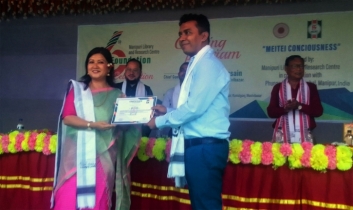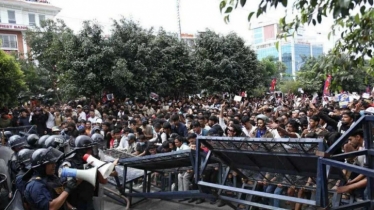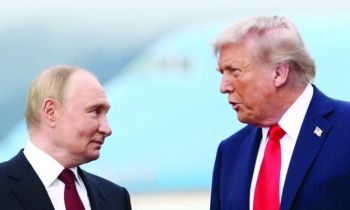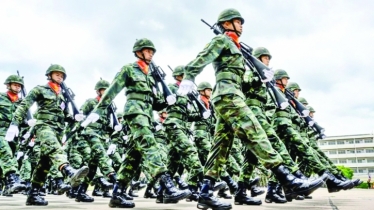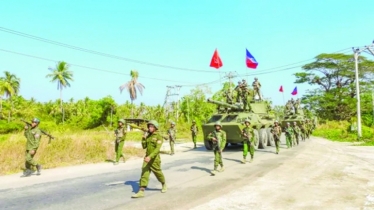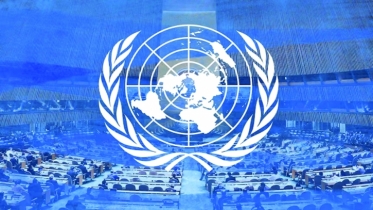
Three years since Myanmar’s military staged a coup and overthrew the democratically elected government, triggering a civil war, the junta’s grip on power is looking shakier than ever amid a growing and determined armed resistance.
While dozens of anti-junta “People’s Defense Forces” (PDFs) have enlisted tens of thousands of young recruits to battle the army across the country, an alliance of ethnic minority fighters has managed to capture territory in northern Shan state, bordering China.
Militias have also achieved successes in Kayin state in the southeast and in Chin state in the west.
The junta is struggling to contain the armed resistance as ethnic and democratic forces fighting the army appear more united than before.
In a show of force, the military is holding its annual Armed Forces Day parade on Wednesday, commemorating the start of resistance to the Japanese occupation during World War II.
Charles Petrie, a former UN assistant secretary general, has had more than 10 years of direct involvement in Myanmar. He recently traveled to the war-torn Karenni state to assess the situation there and its humanitarian impact.
In an interview with DW, he said there’s a paradigm shift that’s happened in Myanmar, which is moving from fear and resistance to the military, into one of actually providing alternative forms of governance and administration.
What were the key takeaways from your recent Myanmar trip?
Well, actually I went there for two reasons. The first was to get a sense of whether international humanitarian aid was reaching the population. But more importantly, I wanted to get a sense of the local governance structures that were starting to emerge.
I had heard about the emergence of local councils, I wanted to get a better sense of what these structures were like. And what I found was actually much more positive than I could have imagined.
In what way?
One of the reasons why the coup has basically failed in terms of the military’s control of the country is because of the resistance of the population, and more specifically the resistance of the younger generation. These young people are very interconnected, very social media savvy, very interlinked inside the country and very much connected to the outside world.
You have this new generation, which is the backbone of the current resistance, in part because they don’t have the same fear of the military that their parents had. They haven’t inherited this level of self-censorship that defined how the Myanmar military controlled the country before.
I was told by these young activists: ‘This is not just a civil war; this is a revolution.’ And I really did get the sense of this popular resistance to the Tatmadaw [Myanmar military] of being something really new.
I think definitely there’s a paradigm shift that’s happened in Myanmar, which is moving from fear and resistance to the military, into one of actually providing alternative forms of governance and administration. The year 2021, I think, did trigger a paradigm shift in Myanmar in terms of looking at the future of the country.
Another point is that there is no space for a quick fix. There is no appetite for a quick solution that unfortunately many within the international community are looking for, with the logic of ‘let’s try and reduce the fighting in order to ease the suffering.’ The resistance doesn’t want a quick fix, they want a resolution to an age-old historic problem that plagued the country.
Some international observers are concerned that the country could fall apart over the struggle. In your eyes, is the dissolution of the Union of Myanmar a threat or a chance?
The country is fragmenting. But its fragmentation is a result of the loss of control of the Myanmar military of many parts of the country. What we’re seeing now is, in the space created, there’s an emergence of new forms of governance. But — and this is important — none of the resistance or the ethnic groups are seeking independence.
What we’re looking at is the desire for a form of federalism that guarantees the rights of different ethnic groups and their ability to work together.
The international community is saying that they don’t want to be held responsible for the fragmentation of the country. I’m saying that’s no longer the issue, at least not right now.
Instead, the issue right now is: How do you conceive a state like Myanmar without a strong center. Acknowledging the realities on the ground of this mosaic of different administered areas and trying to conceive a form of federalism that brings it all together.
Is the emergence of this new state formation the reason why the UN is having such a hard time in Myanmar?
Western governments and the UN are having a hard time accepting something that’s not traditional in their eyes. I think there is a fundamental problem right now which is an inability, an unwillingness to read the situation as it is and to understand the opportunities that the current situation presents for the future of the country.
Western institutions, the UN are very slow and, to a certain extent, almost unable to think outside the box, but that is what is needed in Myanmar.
Could you tell us more concretely how the international community and the UN should tackle this situation?
The first thing I would say is humility. Be humble and realize that you’re entering somebody else’s war and do not impose your lens and your view on it.
One of the things I find very interesting when I talk to people inside and their leaders is that they are not depending on international support. They feel severely let down by the UN. They have had to take care of themselves and they did. Therefore, be humble.
Second, realize that the analysis and approach that was used before the coup does not work anymore. Negotiating access with Naypyidaw won’t give you access to many of the vulnerable groups in the country, simply because the military does not control these areas.
Which means that you have to start engaging with the administration, the governance structures in the other parts of the country. But engaging doesn’t mean just going there to see them from time to time — it demands a lot of work and sustained engagement is needed. Basically, taking localization to the next level. Ask them how to channel the aid. Have the courage to engage with the non-state actors in a substantive way. Basically, it’s about the willingness to operate differently.
What’s been the international community’s response to this new approach you are suggesting?
I think one of the big problems for the UN Country Team in Myanmar today is it does not have leadership. The team is basically orphaned. There has not been a UN resident coordinator in the country since the coup, which means that all of the UN’s agency heads are more preoccupied with their own responsibilities and mandates, than the greater good of the system.
They don’t have any leadership in the country, and they haven’t received the political guidance and political leadership from New York.
The UN needs to urgently address the leadership problem, and then engage with all stakeholders. The UN cannot allow this opportunity to reestablish its relevance to pass it by.
Charles Petrie is a former UN assistant secretary general. During his long diplomatic career, he served as a UN resident coordinator in Myanmar for almost five years and a further four years (2012-15) as coordinator of the Norwegian-led effort to negotiate an end to Myanmar’s historic internal conflicts.

